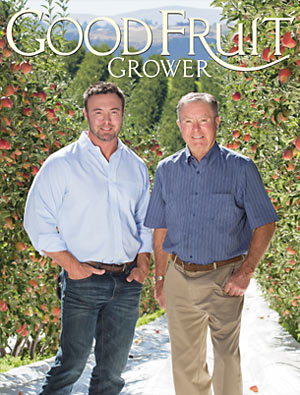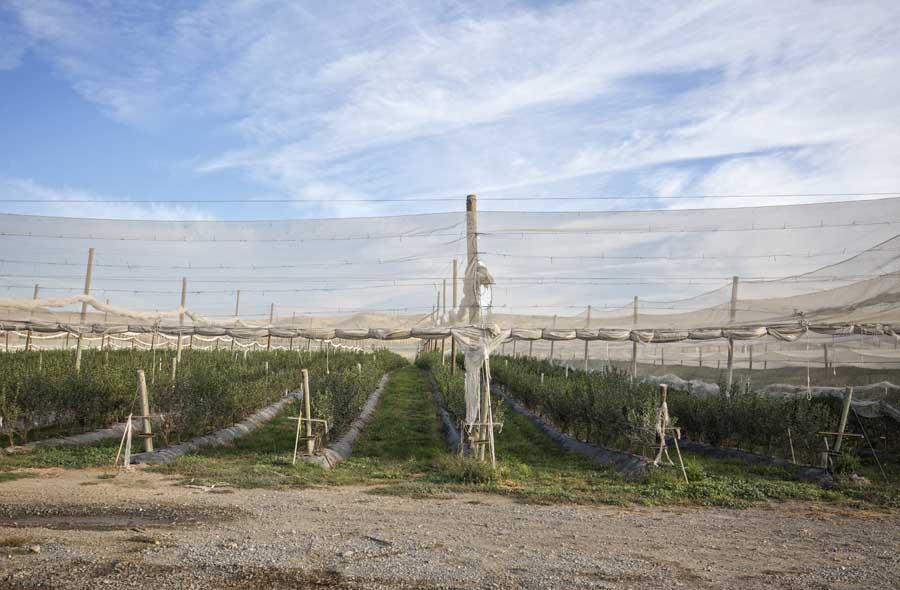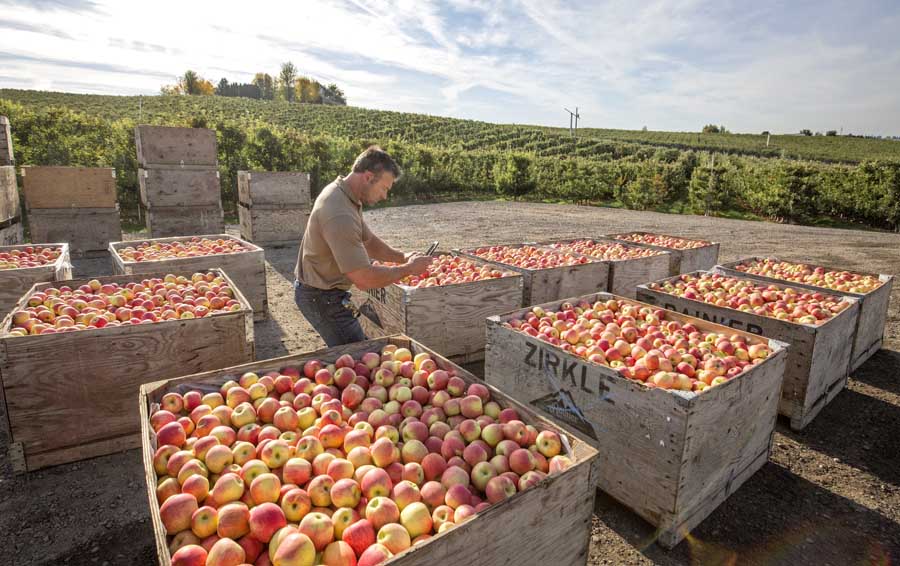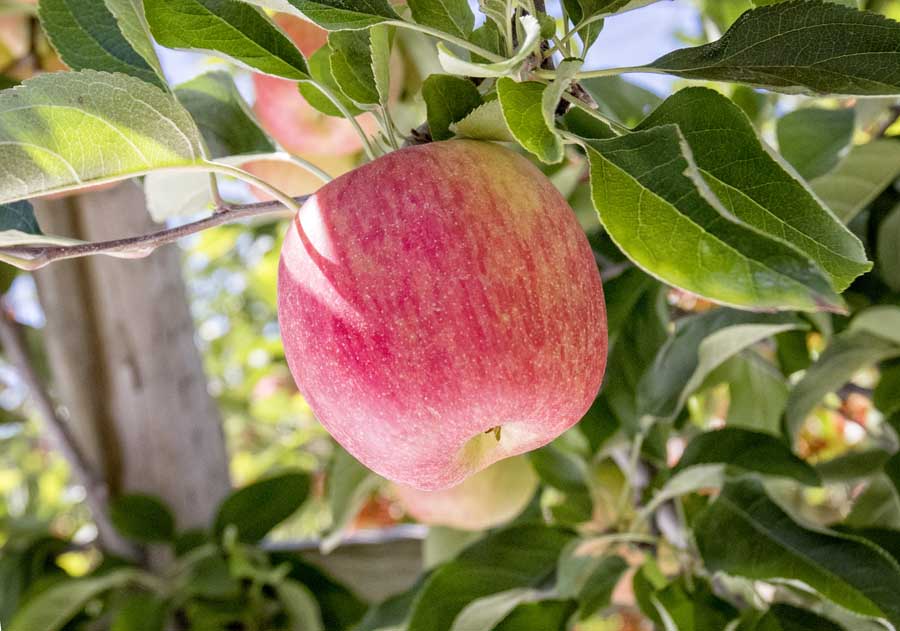
Mark Zirkle looks out over Selah after taking off from the Zirkle main office on his way to check on the apple harvest in Mattawa in late September. With ranches scattered up and down the state, Zirkle can substantially cut down travel time by commuting by air to monitor crops, projects and ongoing ranch upkeep during critical times in the season.
(TJ Mullinax/Good Fruit Grower)
Diversification has been key to many fruit growers finding success in recent years, whether it’s planting new apple varieties or expanding to include new crops.
Bill and Mark Zirkle, Zirkle Fruit

“It’s an exciting time to be in the fruit business. We’re trying to find as many niches as we can.” Mark Zirkle.
Count Zirkle Fruit among the devotees. The company continues to find a spot for itself in new, evolving niches of the industry.
New varieties are regularly being evaluated, including the new Washington State University apple variety, Cosmic Crisp, of which 100 acres will be planted this spring.
When a long-term lease with an orchard group included a roughly 400-acre block of wine grapes — something that was not a part of the company’s strategic plan — the Zirkles ended up expanding acreage and, seeing a need, building a custom-crushing facility.
More recently, the company planted and is growing organic blueberries for the fresh market.
“It’s an exciting time to be in the fruit business,” Mark Zirkle said. “We’re trying to find as many niches as we can.”
Mark or members of his team visit the company’s roughly three-dozen orchards scattered across Central Washington almost daily during harvest to examine the fruit and assess potential sales avenues, going block by block to check return by acre.
But it isn’t just about sales, he said; harvest is his best opportunity to examine strategically, for the long term, how fruit looks for the company.
“Over the course of the year, over a few years, we can determine the future of that planting,” he said. “Is that block going to need to come out in a few years? Maybe it’s turning around and doing well. You reacquaint yourself every harvest to what that tree or that block can do, if it’s going to continue to be a profitable enterprise.”
For many years, success went to those who grew fruit well, said Mark’s dad, Bill.
Today, with all the new varieties, growers need to be smarter.
“If you’re an excellent grower of the wrong varieties, that will be tough,” he said. “A good grower who’s a smart grower, growing the right things, will be just fine. But they have to have their antennas up and do their research to figure out which varieties to choose.”
There’s nothing static about it either, he said, because there are new varieties coming and going all the time. “That means you’ve got to be aggressive,” he said.
Eighty percent of the company’s business is in apples, in terms of both acreage and sales dollars, followed by cherries. Only about 100 acres of pears is currently planted.

A Zirkle organic and fully covered blueberry farm in Mattawa. (TJ Mullinax/Good Fruit Grower)
The plethora of amazing tasting apples in the pipeline mean that, 25 years from now, consumers might not see a lot of the traditional apple varieties on display at the retail market, Mark said. “The retailers are looking for variety, and we’re trying hard to identify the exceptional ones and bring them to market.”
Today, Zirkle grows only 15 acres of conventional Red Delicious, which is very, very little compared with other varieties in its orchards. The company was among the first to plant Honeycrisp in Washington
“I think every shipper has their own variety they’re propagating and selling, and they’re all good,” Mark said.
For Zirkle, that would be its propriety Lady Alice variety, which was a chance seedling in a nearby farmer’s orchard. “I would hope this would mean the apple category will grow and there will be more people buying apples. It’s fun going out there to see what new market is going to do well, where.”
Zirkle is moving toward a 13-foot V-trellis for new plantings, with tree spacing depending on the rootstock used.
“That doesn’t mean we don’t have every tree structure known to man over the last 25 years,” Mark said with a laugh. The structure may lend itself to automation some day, and while Mark said he looks forward to mechanical harvest, realistically, “some of our varieties will have to have hand labor, which means maybe just fewer tractor drivers and support people.”

Mark Zirkle taking a photo of Lady Alice apples waiting to be shipped to their packing facility in Selah, Washington, on September 26, 2016. (TJ Mullinax/Good Fruit Grower)
The company also is gradually moving everything to Geneva rootstocks, though like many growers, they can’t get them fast enough. However, the hope is that the Geneva rootstocks will eliminate disease concerns, such as fire blight, which poses particular problems in their organic blocks.
Almost 50 percent of Zirkle’s tree fruit is in organic production, and all of its blueberries are either organic or transitioning to organic. Blueberries were an area of expansion that was first proposed by Mark’s brother, Lester, who is also an owner of Zirkle Fruit while managing his own farm.
On the wine side, about two-thirds of what Zirkle’s Four Feathers Winery crushes is sold under contract to the larger wineries in the state.
The winery operates very much as a separate business entity and doesn’t currently sell anything in the bottle. If and when it does, that would be another business endeavor that will have to be pursued by someone else, Mark said.
“If my daughters want to go to the glass, that’s a whole other, complicated endeavor,” he said. “That’s another chapter that’s not going to be written by me.” •

Lady Alice apple variety is exclusively propagated by Zirkle Fruit Company and sold under the Rainier Fruit label. The fruit originated with one of Zirkle’s growers in neighboring Gleed, Washington. (TJ Mullinax/Good Fruit Grower)
When new apple varieties were starting to hit the market, Zirkle Fruit knew it wanted something all its own that was local and unique.
The company decided on Lady Alice, a chance seedling from a nearby grower’s orchard that was eventually named after Bill’s mother, Alice.
Its growing technique is something “right out of the ’50s,” Mark Zirkle said: a precocious yet consistent producer that has had never shown problems with cropping, and it carries a sweetness that develops quickly, just prior to picking.
“It’s a challenging apple, not so much to grow but to harvest, because it’s picking window is literally hours — four times in the month of September,” he said.
Zirkle said it’s also probably the most light-sensitive variety he’s ever seen. For that reason, Lady Alice has been planted on Tatura with Extenday, and he’s not afraid to plant it on a south or southeast slope for added sunlight.
– by Shannon Dininny, photos by TJ Mullinax






Leave A Comment